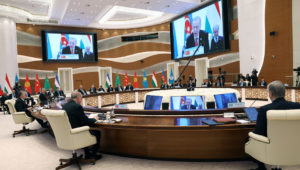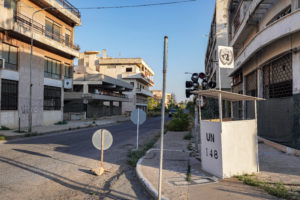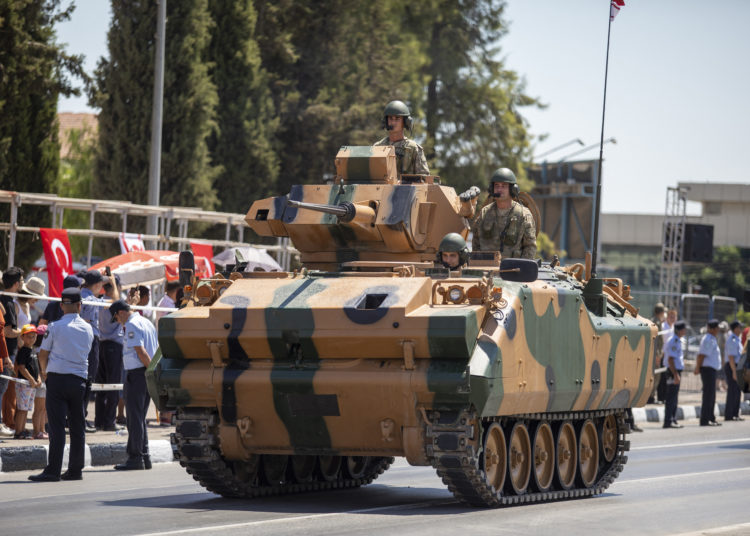Abdullah Bozkurt/Stockholm
Negotiations between Turkey and Israel as part of the normalization of ties included the reopening of a trade office that represented the breakaway Turkish Republic of Northern Cyprus (KKTC), Nordic Monitor has learned.
The office had to cease operations in Tel Aviv after a growing rift between Turkey and Israel on a number of issues such as Israel’s attack on Gaza in 2008, and then-Turkish Prime Minister Recep Tayyip Erdoğan’s harsh critique of Israel at Davos in 2009, as well as the Mavi Marmara flotilla incident in May 2010, which resulted in a bloody clash between Israeli commandos and Turkish activists and the loss of lives. For nearly a decade, the Israeli government has refused to grant visas to KKTC officials, effectively shutting down the trade office in Tel Aviv.
Talks on reopening the trade office have reportedly been going well, and Turkish diplomats are hopeful that a visa will soon be granted to a KKTC official to resume operations in Israel on behalf of the Turkish Cypriot government.
The first public admission of the confidential talks was made by Turkey’s deputy foreign minister, Yasin Ekrem Serim, on January 18 during a briefing at the parliamentary Foreign Affairs Committee.
“We anticipate efforts to reopen the Tel Aviv representative office, which has been closed since 2014 due to the Israeli authorities not issuing visas to the designated [KKTC] representative, will soon yield results,” Serim told the lawmakers.
Minutes from the parliamentary Foreign Affairs Committee:
The government of Turkish President Recep Tayyip Erdoğan has been pushing a two-state solution for divided Cyprus since reunification talks collapsed in 2017 and recently launched a diplomatic campaign to have the KKTC recognized internationally. First established as an independent state in 1983, the KKTC has so far been recognized only by Turkey.
In September 2022, speaking to the UN General Assembly, Erdoğan called for the recognition of the breakaway republic as an independent state and requested the removal of sanctions on the Turkish Cypriots.
“On this island there are two states and two different nations, and this should be accepted by all – it is the key for the solution to the problems on the island of Cyprus to accept that the Turkish Cypriots have equal and sovereign rights and that their international status is to be accepted,” he told the assembly.
Two months later, with Turkey’s lobbying, the KKTC became a non-member observer state of the Organization of Turkic States, an intergovernmental organization that was established in 2009 and that includes Azerbaijan, Kazakhstan, Kyrgyzstan, Turkey and Uzbekistan. In addition to the KKTC, Hungary and Turkmenistan also hold observer status.
The representation at the Organization of Turkic States is deemed an important symbolic move as the breakaway state was accepted as an observer member in an intergovernmental entity with its constitutionally adopted name.

Turkey has also launched lobbying campaigns in the US and UK for recognition of the KKTC and planned to have high-level visits to the breakaway region by foreign officials. Ankara, along with Turkish Cypriot officials, have been pushing to open new representation offices in other countries, with priority given to Austria, Poland, Latvia, the Netherlands and Malaysia.
As of today the KKTC has 26 representation offices in 18 countries including Turkey.
Ankara has taken further steps in recent years to change the conditions on the ground, announcing the reopening of part of the fenced-off area of Varosha (Maraş in Turkish) in October 2020. Further steps for Varosha were announced in July 2021, prompting a condemnation from the UN Security Council.
“The Security Council calls for the immediate reversal of this course of action and the reversal of all steps taken on Varosha since October 2020. The Security Council underscores the need to avoid any further unilateral actions not in accordance with its resolutions and that could raise tensions on the island and harm prospects for a settlement,” the UNSC said in a statement issued on July 23, 2021.

Yet Turkey has so far remained defiant to the UNSC resolutions. What is more, violations of the military status quo along the Turkish forces’ ceasefire line in Strovilia have been on the rise. Turkey also embarked on upgrading its military capabilities in the north of the island, expanding drone operations. The move was seen as a response to the US decision on September 16, 2022 to lift the defense trade restrictions on Cyprus.
Three days after the US announcement, the KKTC submitted a proposal to the UN to formalize the terms of the working agreement between the Turkish Cypriot government and the UN Peacekeeping Force in Cyprus (UNFICYP).
Turkey, which recognizes the KKTC as an independent state, has no diplomatic relations with the government of Cyprus, which is a member of the European Union. Cyprus has been divided into a Turkish Cypriot north and a Greek Cypriot south since an intervention by Turkey in 1974.












